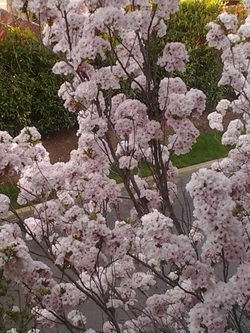 This is the time of year in which we begin to gear up for many types of celebrations and transitions. Quite often our calendars for May and June are chock-full of events which we need to attend in order to celebrate the end of one thing and the beginning of the next. High school graduations are looming and therefore not long after, sons and daughters are going to leave for college. Others might be graduating college or finishing education at whatever level was desired, ready to take on life in a brand new way. For some families soon it may be time to move to another city for a new job opportunity. There are also those for whom it is time to begin a life together through marriage. And again for others it is the time of ordination and the beginning of a new type of ministry. Indeed the months ahead are those in which transitions seem to be all around us. It is interesting, therefore, to realize that in celebrating the season of Easter what we are rejoicing over is the transition of Jesus from life through death and resurrection to new life as Risen Lord. Easter is a time of transition for everyone as we went from Lenten renewal to new life in the joy of Easter. It was also a time of transition for many people into full communion with the church through baptism and confirmation. Throughout the season we are reminded in the Scriptures of the transition of the apostles from a rag-tag group into the leadership of the Christian church. We hear the details of how the men and women who followed Jesus were transformed through His death and resurrection into their true selves, empowered by baptism with water and the Spirit. Most notable are the stories of Peter, who became the leader in Jesus’ place, and Paul, who went from being literally dead-set against the new church to becoming one of its greatest champions. Each one of them was changed through their encounter with Jesus (and by the Holy Spirit) into the person they were always meant to be, loved by God and lovers of God. And each one became a light to those around them, sharing the faith and helping the Church to grow.  If we really stop and reflect upon the process of transformation that takes place through change, especially those which require leaving one way of life for another, we see that it often involves some pain and suffering. Students are often very excited to get out of high school, yet simultaneously they are a bit frightened, even terrified, of the new beginning. There is a push/pull that goes on within them, and within their parents, as they are looking forward to the change and are frightened of it simultaneously. This is true of any kind of change we go through, especially difficult if it involves sickness and death, or a burden we must bear in caring for a loved one. When a spouse passes away, one does not know how he or she will go on because life is changed forever. It was changed forever when they married, but at that point they had a future together to look forward to, and so it was joyous even in the face of the unknown. With a death, there is a void and we do not know how to envision the future. It was no different for the apostles. When Jesus died their world was shattered. They bore the guilt and shame of their behavior during that time as well as their disappointment that He was gone. But when stories of Jesus’ resurrection came to their attention, when Peter and John saw the empty tomb, hope began to take hold. When Jesus walked into the locked Upper Room and said “Peace be with you,” it was not their understanding that kicked in, but rather it was belief. They still were mystified about what had happened, but everything began to come into perspective. Life would never be the same, but there was joy, hope, peace, faith, and new life in every way imaginable. However, this did not mean 'they had arrived' and that all challenges were over. On the contrary, it meant that there would be new responsibilities and new challenges, some of which would lead to suffering and death. But now they had a new focus which led to the unfolding of a new understanding. And this focus empowered them to go forth into the unknown because they knew that Jesus was with them no matter what took place. They had nothing to fear in His presence. They knew the fullness of His mercy and compassion concerning their failures; they knew forgiveness and therefore they could offer it to those who challenged them, along with the mercy and compassion which they had received. They were different because they, too, had passed through suffering, and they embraced the love of Jesus offered to them throughout the entire process. 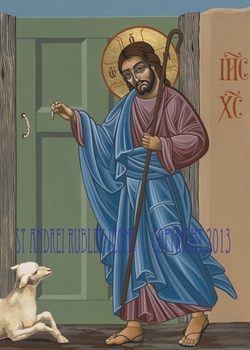 In the gospel for this week Jesus said to His followers that He is the good shepherd and that the good shepherd knows His sheep. He told them that a good shepherd never leaves His sheep and is willing to die for them. What He said that is most fascinating, however, is that there are other sheep in His flock. He said, “I have other sheep who do not belong to this fold. These also I must lead and they will hear my voice, and there will be one flock, one shepherd.” (John 10:16) Jesus wants to lead all His people, even those who are not in sync with the fold, so to speak. He loves us all, including the ones who do not know Him and those who seek to do Him harm. Therefore he needed the apostles to continue His work. They were to reach out to those not in the fold and help them to know of Jesus and His love for them. They were to minister to everyone and they were to do this in the company of the Lord, never alone. This week we also celebrate St. Joseph the Worker. This feast not only honors St. Joseph, but it teaches us to do the work of bringing the Kingdom of God to those ‘other sheep’ through our actions and our relationships. Being a friend takes a lot of work. Our friends (and we) are no different than the friends of Jesus: we will share good times and we will try to help each other when in need. Overall we will mean well, but we will ‘mess up’ from time to time; therefore it will require forgiveness, compassion, and mercy. In our work we may be challenged by difficult managers, the jealousy of co-workers, and the toil of the job. But in all we are disciples of Jesus: we bring Him into every encounter, which may include those ‘not belonging to the fold’ quite yet. If we want them to belong to the fold, we need to gently love them into it through our behaviors. 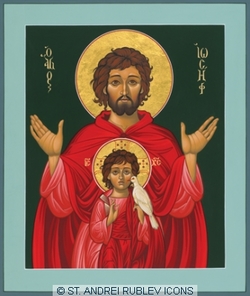 These two thoughts, that transition is part of life and that we need to do the work of sharing the Kingdom, tie together in this one gospel passage. Our relationships, our work, and all our dealings with people in general are part of the work of following the Good Shepherd who is with us always. In order to do His work, we must endure change. This not only helps us to grow, and therefore it strengthens us - (most especially when we feel weakest because then we can do nothing except rely on God) - but it empowers us to deeper compassion, mercy, and love than we ever thought we were capable of having. Transitions are necessary in the same way that Jesus explained when He said the grain of wheat had to die in order to sprout into new life. If not for the breaking open of the seed kernel, the plant would not come forth and it would die a death that is final and without hope. But if the kernel endures the pain of transition, it then dies to its old form and rises in its new, more beautiful form and becomes the one it was always meant to be. So while some transitions are more difficult than others, all are necessary even if they seem to make no sense or that they are almost more than we can endure. The important thing is that we remember we are never alone, and that Jesus is not only empowering us, but He is giving us what we need to continue to grow even more beautiful than we already are. We cannot get through life without transitions, and thank God for that, because without transition there would be no life with God forever. 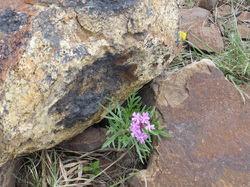 May we seek Jesus in whatever change we are experiencing! May we hold fast to our baptismal faith, hope, and love when we feel most challenged, trusting in Jesus our Good Shepherd! May we help each other as we go through transition! May we accept the work which is given us, knowing that no matter what it is that we do, it is in order to build the Kingdom! And may we realize that our Good Shepherd knows us intimately, is with us always, and loves us beyond anything we could imagine! Let us continue to meet in the Heart of Jesus! Alleluia! Peace! ©Michele L. Catanese The photos are all my own: the first was taken in Long Island, New York in late Spring. The butterfly was taken at my home. Butterflies can be seen as symbols of change since they have a very colorful and distinctive life cycle complete with dramatic change from caterpillar to chrysalis and cocoon, to butterfly. The photo at the end is of a wildflower coming up from a rocky surface in Big Bend National Park, TX. Life comes forth from the (seemingly) lifeless. The icons are the work of Fr. William Hart McNichols. The first is El Buen Pastor (The Good Shepherd) which can be found at http://www.fatherbill.org/all-categories/product/37-el-buen-pastor The second is St. Joseph Shadow of the Father which can be found at http://fineartamerica.com/featured/st-joseph-shadow-of-the-father-william-hart-mcnichols.html 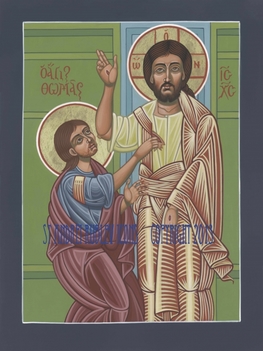 As we enter more deeply into the Easter season we continue to focus on the appearances of Jesus to the apostles and disciples. We might imagine what it would have been like for them, and we may be just a tiny bit envious that they were able to see Jesus such as He was in resurrection. Like Thomas we want to see the wounds and to experience what the others saw. Even if we do not need to see to believe, we still would love to see. I think many of us would like to have been there to see Him as they did, to have been like the proverbial ‘fly on the wall’ so that we could actually lay eyes on Jesus the resurrected Lord as He appeared to the Eleven and those gathered in the Upper Room. However, we may feel that the apostles were more significant than we are, and therefore it was right that they saw Jesus. After all, He had hand-picked them and they had been prepared for their future ministries as the ones who would build the church. We might even feel that we are too insignificant to have a ‘real time’ view of the Risen Christ such as they did. Of that, I do not believe. Just this past week I had the joy and delight of being able to go to west Texas to an area called Big Bend. As beautiful as the terrain of the National Park is, with its mountains, desert, varied birds and wildflowers, the most stellar part of the trip was the visit to the McDonald Observatory in Fort Davis, TX. (Pun intended) The observatory is incredible in its own right with telescopes that are wonders to behold. But it was the nighttime “star party” that enchanted me. At around 9:15 PM we were taken outside to the amphitheater to view the night sky, free of all ‘light pollution’ since we were in the darkest part of Texas on a clear night, (thank God.) To say it was spectacular is a gross understatement. We saw with the naked eye constellations such as Cassiopeia, Orion, Ursa Major and Minor, star clusters such as the Pleiades, and some planets, such as Venus, Jupiter, and Saturn. After the show we were able to walk around the area to view space through various telescopes. I saw Jupiter with such clarity that I could see four of its moons; even the large ‘floating’ storm was faintly visible. And I also saw a galaxy or two, such as Messier 51. It was a time of grace, gratitude, and deep wonder and awe. Just trying to comprehend the vastness of the universe was almost more than I could manage. Looking up at the sky, attending the marvelous presentations, and seeing countless stars were amazing experiences. At one point we were told in a symbolic analogy that there are as many galaxies in the universe as there are grains of sand on the beaches of the world, and that with all scientists know about space, 96% of it is still unknown. As I looked into the telescopes, especially the ones trained on stars and galaxies that were distant, I felt increasingly insignificant. In using the analogy of each galaxy being like grains of sand, then we are comparatively as small as the smallest division of a quark.* That makes us profoundly insignificant, indeed. But all this insignificance is significant because as small as we are, we are known and loved to a greater degree by God than the entire universe combined. Everything about us is known by Him. With all that is in the universe, most of which is beyond our comprehension, God has every one of the hairs on our head counted (Matt 10:30) and knows each and every one of us intimately. And He knows our sins and forgives them when we ask. (Acts 3:13-19) His love and mercy are boundless! If we were really so insignificant, He would not have cared enough to come to earth, die, rise, and therefore free us from all that holds us bound, including death. No matter who we are, where we are from, what our socio-economic status, sexual orientation, health status, mental capacity, gender, or age may be, we matter immensely to God. This is a greater marvel than the wonders of deep space and a thought far more beautiful than the night sky, with its lovely Milky Way (in which we reside, by the way). With all the stars, galaxies, and ‘what-have-you’ out there, as small and seemingly insignificant as you and I are in the universe, we are the center of God’s attention each and every moment of our lives. Even when we sleep, He is mindful of us. (Psalm 139 and Matt. 28:20) There is no greater reality than this. We are significant in our seeming insignificance. This gift of God’s love and attention to us is simply stunning. 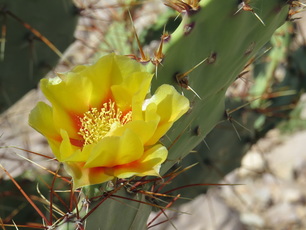 In this third week of Easter we encounter Jesus with the apostles who think they are seeing a ghost. (Luke 24:35-48) They think their eyes are deceived, and yet in their terror Jesus reassures them by saying, “Peace be with you!” He knows that seeing Him resurrected is more than just a little startling to them, so He offers them His peace. Their terror turns to joy, but Luke describes it in what seems to be an oxymoron. He says, “…they were still incredulous for joy” which basically means that they were skeptical, yet filled with joy in Jesus’ presence. In other words, their minds and hearts were in conflict with one another. That they were incredulous for joy is not unlike my experience with the stars. It was a joy that somehow co-exists with the acceptable incomprehension which we call faith. The joy with which they were filled could only come from God. They knew deep within their hearts and minds that this was Jesus, who was both their friend and their Lord. They did not really need to understand because any attempt at understanding would distract them from the reality of being with Him. They wisely chose to savor the moment rather than to try to dissect it with rationalization and understanding. In other words, they had learned to discern what was more important: it was not feeble attempts at understanding that which cannot be understood which was important, but rather it was simply being in the moment which was the most real of all realities. They were with Jesus, who is Lord and yet friend. These seemingly insignificant fishermen, and those of other similarly ordinary backgrounds, were incredibly significant to Jesus.  The other lesson that these apostles and disciples learned is that every single person to whom the Lord had spoken, whom He had healed, and whom He had freed from sin, was equally significant. They came to see in that one moment that everyone who was to come, all those who were to believe because of the word of men and women like them, were all equally significant to God. Those apostles and disciples (and Mary, His mother, who Scripture tells us was present in that upper room) learned not only that they mattered to Jesus, but that each and every person who was, is, and is to come is immensely important to Jesus. It was not about them: it was about all of us. The apostles, who at times seemed overwhelmed in their attempts to get it right during the life of Jesus, had at last “gotten” it. They understood that to be a follower of Jesus one has to be the servant of all. One has to be humble, willing to be insignificant in service of those who are rich and to those who society deems as outcast. The apostles had learned the lesson taught by Jesus throughout their time with Him. Had Jesus lived in our age instead of in first century Palestine, I wonder if He might have told a parable about the stars in space and our place within them. No matter, the lesson is this: we are all significantly insignificant. That is, we are infinitesimally small amidst all of creation and because of that we ought to be truly insignificant to Him, but instead, we are known down to our last hope and desire. We are immensely significant to God, who created us intimately, and who in intimacy knows our heart and mind even better than we do. And He loves each of us as if nothing else exists. In light of what does exist, that is nothing short of astonishing. 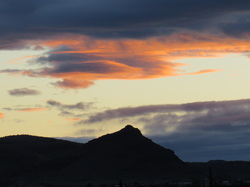 May we be filled with awe and wonder at the vastness and incredible variety contained in the universe! May we have a sense of the greatness of the gifts we have received in the beauty of creation! May we be responsible stewards for all that which is contained in our home, the planet on which we reside! May we know, as the apostles came to realize, that we are all significant to God no matter what anyone else thinks of us! May we have the humility to serve and to let others serve us! May we have deep gratitude that God has created us, and knows and loves us intimately! And may we be filled with the mercy and peace of Jesus as we learn to recognize Him in those around us! Let us continue to meet in the heart of Jesus! Alleluia! Peace! ©Michele L. Catanese *For an explanation of what a quark is click here: http://en.wikipedia.org/wiki/Quark The icon at the beginning of this post is called The Risen Lord Appears to St. Thomas by Fr. William Hart McNichols. If you are interested in a copy as a plaque it can be found at http://www.fatherbill.org/all-categories/product/288-the-risen-lord-appears-to-st-thomas All of the photos are mine. The ones in the series are, respectively, The Chisos Mountains in Big Bend National Park, the McDonald Observatory, and the huge telescope inside the observatory. -Next is a cactus flower. I chose this because it is a bit of 'an incredulous joy.' Where the desert seems so stark and possibly lifeless, everything is in bloom; even a prickly cactus has a joyous beauty about it. -The following photo is of one (lonely) bluebonnet, the state flower of Texas. There were bluebonnets everywhere, so this really does not portray the myriads of flowers lining all the roadways. And that is precisely why I chose this photo. The flower is significant and was noticed even when alone in the sand. (This lone flower was near the banks of the Rio Grande. Bluebonnets in Big Bend can grow to three feet high.) -The final photo is a sunset over the Chisos Mountains. 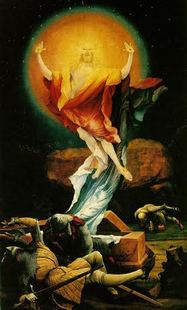 We are an Easter people. We live our lives in light of the resurrection of Jesus. Therefore during these seven weeks of Easter (and beyond) we remember that all we do is affected by the fact that Jesus died and rose so that we might have life to the fullest (John 10:10 and Luke 6:38). This is not really just a season we observe, but rather a way of life for all those who believe. In whatever way we envision the resurrection we know it was something that took place in wondrous beauty because it was the release of the greatest power on earth which is love. I have imagined that when Mary Magdalene encountered Jesus at the tomb, or when He appeared to His mother, (not mentioned in Scripture), these events took place in the beauty of a perfect day, in the cool of the morning. It was not in stillness, but in the sounds of the world at its best. This is how I envision it, but no matter what it was like, there truly was no more perfect day than that one. The resurrection made life beautiful. Recently I heard a song with the title “Life is Beautiful” which is part of the inspiration for this reflection. Though the song is about a man’s love for a woman who clearly makes his life more beautiful, it made me think that it could also be a song of love for God. The refrain says: “Life is beautiful, life is wondrous, every star above is shining just for us; life is beautiful, on a stormy night, somewhere in the world the sun is shining bright.” * The composer had me at “life is wondrous.” In light of the resurrection life is indeed wondrous. We have received the greatest gifts of mercy, compassion, and love in the death and resurrection of Jesus. His resurrection conquered sin and death and opened the way to salvation for us. Therefore on a stormy night the light is indeed with us. Even if we cannot see it we know this because of the gift of faith. Life is wondrous! 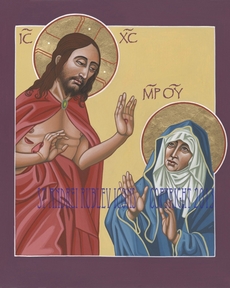 Life is a great gift to be savored and enjoyed. But sometimes we may feel a bit ambivalent like St. Paul when he said, “For to me life is Christ, and death is gain. If I go on living in the flesh, that means fruitful labor for me. And I do not know which I shall choose. I am caught between the two. I long to depart this life and be with Christ, [for] that is far better.” (Philippians 1:21-23) However - (and it is an important “however”) - Paul goes on to say that while he wishes to be with Christ in Heaven, he realizes that he has work to do and that this work is his calling. Therefore as much as he longs for heaven, he has a purpose, and therefore he chooses life in order to serve God and to spread the faith. St. Paul was suffering imprisonment when he wrote those words. He had some physical ailments as well as the suffering that came with being in a prison; therefore we know that it was a time in which he had much pain. Yet Paul recognized that life was a beautiful gift, so that as much as he longed for a cessation of his suffering, and as much as he had an even deeper desire to simply be with Jesus whom he loved so deeply, he knew that God had called him to bring others to Christ. Therefore he could embrace all that life brought because of faith, hope, and love. It was not a burden for him necessarily because Paul really did love life. How could anyone who had an encounter with the risen Christ, such as he did on the road to Damascus, not see life as transformed by love? Paul saw the beauty of the world even in the midst of the sin and corruption around him. This was because he saw the world in light of the resurrection and everything was suffused in that light. Life was wondrous for him. 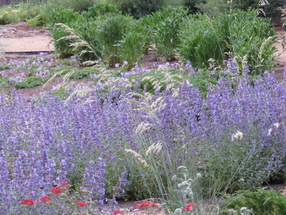 Like St. Paul we are a people who live in light of the resurrection. It was not an event that happened long ago and which we simply remember. It was an action that transformed the entirety of creation, giving a beauty that transcends what we see or feel. The beauty of the resurrection contains elements that we can only fully appreciate after we pass through this life and are in the next when all is revealed to us. But even so, the beauty that permeates everything has the power to let us see beyond what our eyes perceive, what our ears hear, what our minds reason, and what our hearts feel. It is the beauty of life transformed by a love so great that the tomb could not hold it. It is a life transformed by mercy, compassion, forgiveness, and healing. It is a life that now holds hope, the promise of things to come which were not available to us prior to Jesus bursting forth from the grave. I know some of us are still waiting for Easter joy because of suffering in our lives or in the lives of those whom we love. In many ways all of us are still waiting for the fullness of Easter joy because of the suffering of the world, with its injustice, corruption, sin, terror, and disease. But we have been promised that sorrow and mourning will flee and that suffering will be no more. (Isaiah 35:1-7,10) The resurrection strengthens our resolve because God’s promises were fulfilled in Jesus Christ and therefore we have renewed faith and hope that we will have the final victory through Him in the end. We did not have that hope before Jesus came, taught us, healed many, loved all, died and rose. That the Son of God went through it all ought to be enough, but it was not done simply to impress us. He did it so that in His great love we may be healed and set free. He did it so that life would be more wondrous than ever before because now we always have a vision of things to come before our spiritual eyes. 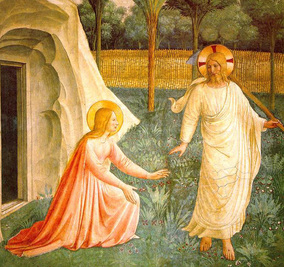 As we hear the Gospel readings and those from the Acts of the Apostles, let us be there within these stories, allowing ourselves to see the wonders of the risen Christ immediately after His resurrection and to experience how this event propelled the infant church into vibrant life. We need to let our imagination work with the Scripture so as to pick up the beauty with which the apostles saw the world after the resurrection and Pentecost events. When we are at the empty tomb with Mary Magdalene seeing Jesus, even after mistaking Him for the gardener, we should say with wonder, “I have seen the Lord!” because we have. When Peter and John healed a cripple in the street we need to let our eyes grow large with wonder. When we sing our ‘Alleluias’ we should do so knowing that sorrow and mourning fled for those early followers of Jesus whose lives seemed bleak due to oppression and were now filled with the promise and hope of new life in Christ! We, too, have that same promise, that same hope. Perhaps we need to ask the Holy Spirit to enliven our minds and hearts anew with the grace of the mystery and power of the Risen Christ. If we desire this, we will have it. This grace will help us to see beauty where others do not. It will help us to see beyond the visual to the reality of what is beneath the surface. This grace will help us to know that no matter how menial our daily tasks are, or no matter how overwhelming they may seem that like St. Paul we have a call and a purpose. This grace will help us to move outwards towards others in ways we may not have thought possible. All this because of a power called love. It will enable us to see all of life in the light of the resurrection, transforming the entire world into the realm of beauty, redemption, and mercy. There is no stain that cannot be removed, there is no sin that cannot be forgiven, and there is nothing which is beyond hope, even if we do not see it readily. What we do have is the promise which we trust in because everything is permeated with the resurrected Christ. All we have to do is open our eyes, our minds, our hearts, and our arms to embrace this gift. Then we will see that life is beautiful. Life is wondrous. Life is a miracle, bathed in beauty. Why? Because He who was once dead, now lives. Life is wondrous! May we have the eyes to see and the ears to hear the wonders of the Risen Lord! May we have a renewal of the faith, hope, and love given to us in baptism so that we may trust in the Lord’s promises to us! May we see the world as it is, filled with wonder and beauty which cannot be overcome by darkness no matter how it may appear to us! May we be filled with the courage to see as Jesus sees and to love as He loves! And may we have the joy which comes from the resurrection of Jesus, savoring the gift of life such as it is! Let us continue to meet in the Heart of the Risen Lord! Alleluia! Peace! ©Michele L. Catanese *The song Life is Beautiful is by a blues artist, Keb' Mo'. For the lyrics to the song click here: http://www.lyricsmania.com/life_is_beautiful_lyrics_keb_mo_1.html -To hear the song click here:https://www.youtube.com/watch?v=OI_GNu8jaSA&spfreload=10 (I apologize if an ad pops up first. I have no control over that.) The first painting is The Resurrection by Matthias Grunewald. It is part of the Isenheim Altarpiece. Next is the icon The Risen Christ Appears to His Mother by Fr. William Hart McNichols. It can be found at http://www.standreirublevicons.com/gallery-views/jesus-gallery/product/56-the-risen-christ-appears-to-his-mother The photograph is one of mine, some lavender in a garden. This is followed by a painting by Bl. Fra Angelico called Nolo Me Tangere, depicting Mary Magdalene at the empty tomb encountering Jesus on resurrection morning. 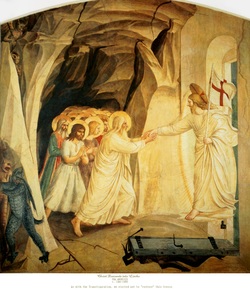 He is Risen! Finally we can say the word we have longed to say: “Alleluia!” And finally the Word has spoken to us: “I have conquered sin and death for love of you!” The Word, Jesus Christ our Lord, has indeed risen from the grave. Nothing is the same. Everything is illumined. What was once dark and hidden is now in the open and bathed anew in the light of love, compassion, and mercy because Jesus has saved us by His death and resurrection. For forty days we have been in the process of Lent, trying our best to make sacrifices, to pray more fervently, to be more generous, and to do penance for our sin and that of the world. Nothing we have done, however, is equal to the price Jesus paid for us to have the salvation He offers. That should not make us feel guilty. On the contrary, the beauty of what He has done is in that very fact: there is nothing we can do that would ever be enough to equal the price He paid. Our efforts were and continue to be very important as we try to grow in holiness. But we do not earn salvation. He died for us because of love, not because of our guilt. That is indeed the unfathomable aspect of the death and resurrection of Jesus. Just as He came into the world out of love for us, He left the world as He did out of love for us. Nothing changed about the purpose of His life and His mission from start to finish. It was pure gift and this gift was always about love. 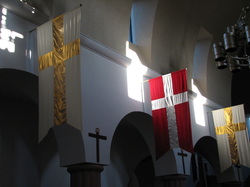 In Franciscan spirituality there is a tradition that because of the greatness of God’s love the Son of God would have come into the world even if we had not fallen into sin. He would have gone through with everything from birth through His horrendous suffering and death simply because He wants us to know how deeply He loves us. He does love us that deeply, but the reality is that we did fall from grace, we have sinned, and we did need Him to die and rise. And paradoxically, our rejection of Him made Him only love us the more. “Oh happy fault,” as we hear sung in the Easter Proclamation (the Exsultet)* at the Easter Vigil Mass: our sin did necessitate His coming. That we do not deserve the gift makes is all the more precious. Nothing we did or can do will ever change His mind about His love for us. His love is beyond anything we can fathom or imagine. At the Easter Vigil we are reminded through the Scripture readings of the consistency of God’s loving actions. We are reminded of creation, which began in beauty but was marred by disobedience, and yet it was not a complete ruination. That is because rather than annihilating Adam and Eve, God continued to give the gift of life, though it was limited by physical mortality. He did not abandon them, but rather He stayed with them in the beautiful world He provided for them in the first place. He gave them the gift of childbirth, so that forever after we would marvel at the arrival of beautiful little people who we have the pleasure and the gift of raising into adulthood. God, in continuous desire for our happiness, blessed His people to become a great nation, even when time and again they abused His love by betraying His covenant. In all the readings of the liturgy we hear messages of hope and of the victories He won for His people. 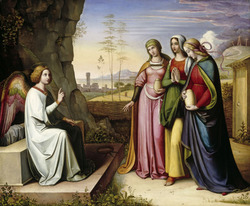 Then we hear of the greatest gift of all: the women went to the tomb only to find it empty. Jesus had won the victory over sin and death that only He could accomplish. Everything Jesus had done during His life was in order to meet that end. During His ministry He had continued the work of creation by healing those who came to Him and those who He met on the journey. He healed, forgave, and freed people right up until the moment when He breathed His last on the cross. Death could not hold Love down: when He died He gave us the ultimate healing, forgiveness, and freedom by descending to the netherworld, freeing those held there, and then rising in glory. What is it that propelled Jesus through death and into resurrection? What is it that will continue to be with us for the entirety of our lives as we go through our own suffering, passion, and death? And what will help us to rise with Him on the last day? The answer to each question is Love. What we are witnessing and what we are rejoicing in this Easter is the conquering of all that is not of God by love. However, we must remember that the work is not over quite yet. Jesus overcame death, but we are needed to continue His work in our imperfect world. He has given us what we need to overcome all that assails us, and that is the power of love and all that which love means. Jesus’ saving act reminds us that He constantly re-creates, He constantly forgives sin, and He makes everything more beautiful. Everything that was dimmed during Lent is now afire with the glory of the Risen Lord. We need to remember that what Jesus did is beyond our understanding and our imagination; it was freely entered into and was accomplished by the toil and action of God alone. Everything takes on a new light given the power of His love which was released in a new way at Easter. Every detail of life is renewed and He has broken down all barriers, even entering into our loneliness and suffering in order to redeem it with the hope of healing and salvation. We are assured that He is with us in everything and will give us healing, even if not in this life. 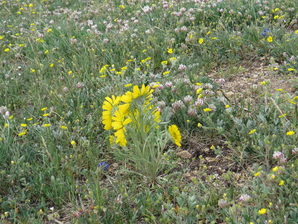 Therefore, everything is now seen in a new light and with a new clarity. Even the smallest flower, whether it is a cherry blossom or a tiny wildflower, is exquisite in its beauty. And, if small flowers abound in beauty, we also need to recognize the beauty of all life around us, especially that of our brothers and sisters. Love is emblazoned into our world and our hearts in the release of Jesus from the grave and the victory He has won for us. If we really allow ourselves to ponder upon what He has done for us, we would never stop crying tears of joy. And in this joy, we would recognize that the love He has for us is love for the life of the entire world. It is not ours to greedily possess, but it is ours to share in and to give away. And wonderfully, through the power of the resurrection, the more love we give away, the more we discover deep within our hearts. Some of us may have great difficulty in feeling like rejoicing due to the circumstances of our lives. As long as we are here, suffering will be with us. It is clear that there is much in our world that is seemingly getting more broken by the minute and there is much that happens to us which causes pain. But what the resurrection assures for us is that 'this too shall pass,' and that during our time of travail we are never alone. God has fulfilled every promise He has ever made for us. It is not a matter of whether we deserve it, because surely we do not. But because of the resurrection of Jesus, we know that in the end He will fully overcome all evil, all sin, all suffering, all pain, and all that limits us. He left us not alone, but rather He is present in His Body and Blood to strengthen us as food for the entire way we need to travel. He gave us the cleansing water of baptism in which we receive the essential graces of faith, hope, and love in order to help us to circumnavigate the dangers of our world. He accompanies us through life with the many graces given to us, particularly in the gift of forgiveness so that we can be unencumbered by that which would keep us distant from him. With every sacrament, we participate in His resurrection anew. Let us rejoice, therefore, and be glad that we have this indescribably beautiful gift! 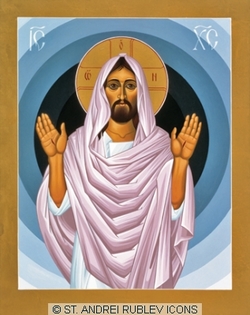 May we rejoice and be glad that we have the unfathomable gift of the love of God through the death and resurrection of Jesus Christ! May we give thanks and praise for the gift of Jesus conquering sin and death as we await His second coming which we know will happen in due time! May we allow the light of the Resurrection of Jesus to enable us to walk through the dark places in our lives and in our world! May we allow the joy of the resurrection to enliven us to live as Easter people, joy-filled, loving, compassionate, and merciful! And may our lives shout that He is risen from the dead! Alleluia! Alleluia! Let us continue to meet in the Heart of the Risen Lord Jesus! Peace! Alleluia! ©Michele L. Catanese *The Exsultet, the Easter Proclamation, is sung at the Easter Vigil just after the Easter Candle has been lit and the church has gone from deepest darkness to blazing light. It is a very moving and breathtaking moment. The Exsultet is only sung once a year. The painting at the top of the post is The Resurrection by Bl. Fra Angelico. Next is a photo I took at an Easter Vigil a few years ago. The next image is a painting of the three women at the tomb of Christ by German painter Peter von Cornelius. Following the painting is another of my photos of some wildflowers on a mountainside in Colorado. Finally is The Risen Christ, an icon by Fr. William Hart McNichols. The icon can be found at http://fineartamerica.com/featured/the-risen-christ-william-hart-mcnichols.html. |
Heart Speaks to Heart
|
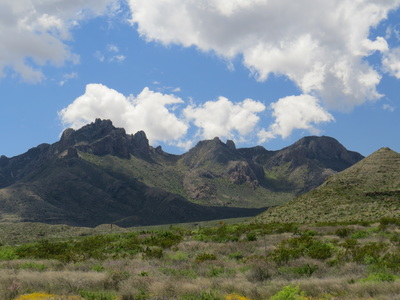
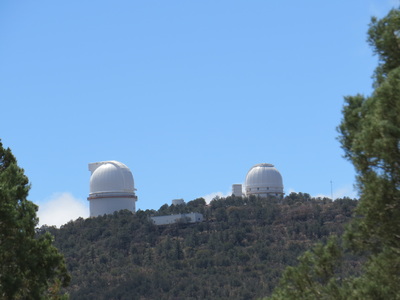
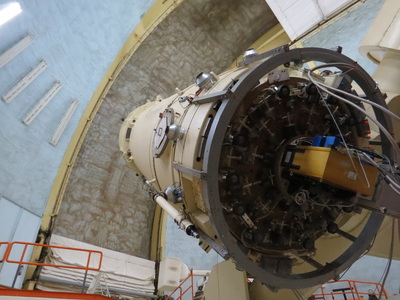

 RSS Feed
RSS Feed

